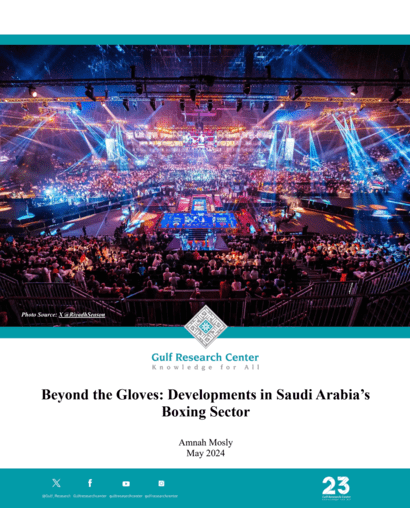
The Kingdom of Saudi Arabia continues to move forward in diversifying its economy, fostering national pride, and contributing to the overall well-being of its citizens. A particular focus in this regard is on the sports sector, which the Kingdom has rapidly expanded since the launch of Saudi Vision 2030 in April 2016. From hosting international tournaments to local Olympic-style competitions known as the Saudi Games, the Saudi government appears committed to strategically and systematically accelerating the field of sports. But it is not limited to high-profile events or showcase competitions. Rather, Vision 2030 needs to be seen here as a comprehensive roadmap for the future of Saudi Arabia, with sports as a critical pillar of the Quality-of-Life Program for the nation’s development.
Despite many of the achievements accomplished so far, particularly for women and youth, the Kingdom continues to face significant scrutiny concerning its overall motives. But it is not just Saudi Arabia that is being brought into question for its sudden visibility on the sports scene--Qatar, the first Arab country to host the World Cup, was the subject of international criticism from the time it won the bid to host back in 2010, all the way through to (and after) the event in 2022. In the Kingdom, one of the main accusations is that the nation is “sportswashing” its reputation by investing in and developing its sports sector. This has been highlighted by its recent significant investment in LIV Golf and the recruitment of big-name international football players to Saudi teams, such as Neymar, Karim Benzema, and Cristiano Ronaldo, to mention a few.
The Kingdom faces the same hurdles as it enters more heavily into the sport of boxing and international pundits lay out their arguments against it establishing a presence there. Yet, it is necessary to view the sport in its proper context. While Saudi Arabia has emerged only in recent years as a prominent destination for high-profile boxing events, drawing international attention and participation, the history of boxing in Saudi Arabia can actually be traced back to the early 20th century when the sport began to gain a fanbase in the region. More recently, factors such as the government’s increased focus on diversifying the country’s sports offerings and the growing global interest in combat sports can be identified.
The Kingdom has hosted several major boxing matches in recent years, including the highly anticipated fight between Amir Khan and Billy Dib in July 2019 and Anthony Joshua and Andy Ruiz Jr. in December 2019. These events, held in Diriyah, not only showcased Saudi Arabia’s capacity to host large-scale sporting events but also signaled the Kingdom’s ambitions to establish itself as a hub for boxing in the Middle East. The Kingdom then held the mega-boxing match between Tyson Fury and Oleksandr Usyk for the undisputed heavyweight world title on May 18, 2024, at the Kingdom Arena in Riyadh.
Despite international criticism, the fighters themselves could not be happier. John Fury, Tyson’s father, has expressed that “Tyson Fury and the Fury family will only fight again in Saudi Arabia…This is where our heart is, we love it, the people love us…I can’t express how much I enjoy this country and the people…” There has also been some international praise. London-based Daily Mail’s sports editor Oli Gabb expressed that “whether you are a fan of the growing boxing scene in Saudi Arabia or not, the investment from the Middle East has forever changed the face of this sport.” Gabb argued that “a lot of effort and investment [has] been made in the events of the Riyadh Season…and this demonstrates the seriousness of his approach in making Saudi Arabia the boxing capital of the world. With numerous major matches held in Saudi Arabia, the Saudis have provided significant financial support and shown seriousness and credibility in their dealings. So why wouldn’t boxers prefer to come here?”
Looking ahead, the future trajectory of boxing, and sports in general, in Saudi Arabia is filled with promise. Several indicators point towards sustained growth and evolution. The government’s continued commitment to sports development, as outlined in the Saudi Vision 2030, underscores the significance of boxing and other sports as crucial components of the country’s social and economic progress. This long-term vision aims to create a vibrant sports ecosystem, foster active and healthy lifestyles, and position Saudi Arabia as a leading sports destination regionally and globally.
In line with this vision, Saudi Arabia is anticipated to continue to attract high-profile boxing events, drawing elite boxers, fans, and media attention from around the world. The country’s strategic investments in sports infrastructure, coupled with its growing reputation as a host of world-class sporting spectacles, are likely to solidify its status as a preferred location for boxing championships, title fights, and exhibition matches.
Overall, it should be acknowledged that the developments in sports in Saudi Arabia reflect a transformative phase in the country’s overall path forward. The country’s youth population presents a tremendous opportunity for nurturing talent across various sports disciplines. Furthermore, the increasing interest in sports among the general population, coupled with the government’s widespread support, bodes well for the continued growth and diversification of the sports sector. With a clear vision for the future and a determination to meet existing and potential challenges, Saudi Arabia will play a key role as a dynamic force in the global sports landscape. As a result, the future of boxing in Saudi Arabia holds immense promise for athletes, fans, and the broader sporting ecosystem, despite international criticism arguing otherwise.

